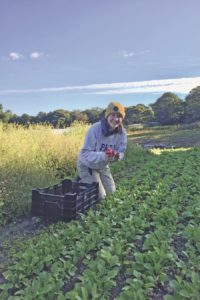Isabelle Nobili is a 2021 Nauset Regional High School graduate who has ambitious college plans. She’s going to Johns Hopkins University in Baltimore. What she wants to study there is dirt.
Nobili credits her high school gardening mentor, Rand Burkert, with firing up her love of the land. Burkert, who now teaches in the greenhouse at Nauset Middle School, is, at least as Nobili remembers him, a permaculture guru.
“His passion for sustainability and agriculture is contagious,” Nobili says. She remembers him introducing her to the idea that growing food could be more than that. It could be about fostering ecosystems to be more resilient. What he taught her, she says, was to be “intentional.”

But it was on a visit to Bob Wells’s Eastham farm that Nobili realized “the tremendous importance of soil health.” Some people know Wells as Eastham’s star turnip grower. Wells also produces biochar, a charcoal-like substance created by burning wood, brush, or leaves in a controlled process called pyrolysis. Biochar adds nutrients but also increases the soil’s ability to retain water — so important here, where soil is sandy.
Wells traveled to the Amazon in 2010 to learn about a carbon-rich soil known as “black earth.” Nobili, too, has her sights set on travel as a way of learning more about farming.
Her dirt studies — a concentration in global environmental policy — will wait a year. To that the International Studies Program at Johns Hopkins has agreed.
First, she’ll embark on a cross-country trip in a camper that her dad, Nick Nobili, helped overhaul. She’ll be driving from her hometown in Eastham to California to work on two different farms there. She has also lined up work at a cattle ranch in Chile and later at a farm that educates visitors on permaculture in Brazil.
Nobili will be “wwoofing,” she says, that is, working in exchange for room and board and the chance to learn about farming and other cultures. The four farms she chose are either part of the World-Wide Organization of Organic Farmers (WWOOF) or part of another program called Workaway, both programs that Nobili heard about through friends.
Nobili sees her stop in Chile as offering a bonus: a second chance at learning Spanish. “I’ve been studying Spanish since the seventh grade,” she says. “But learning it on Zoom didn’t really work for me.”
Nobili says she is grateful for the farm-related jobs she’s found here. A five-month stint at the Chatham Bars Inn Farm in Brewster “was a perfect small-scale farm experience,” she says. That’s where she says she learned the basics of growing and harvesting.
Volunteering with SustainableCAPE on its food equity program for the past two summers helped Nobili decide that sustainable farming could mean “working exactly where you can make a real difference.”
She and a group of seven other high school student interns ran the Grow-a-Row for Neighbors campaign, where local backyard farmers donate extra produce they’ve grown. The students gathered the donated produce and brought it to spots where neighbors in need could make their selections.
SustainableCAPE founder Francie Randolph is confident Nobili is “not only going to inherit the world, but change it.”
“We all need to eat,” says Nobili. She hopes her studies at Hopkins will help her figure out how to do that sustainably. “The kind of agriculture I want to pursue for all of us is intentional about the health of the soil, the environment, and our health, too.”



